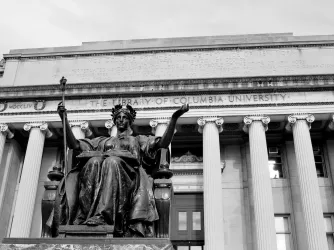Table of Contents
In anti-intellectual email, Wellesley profs call engaging with controversial arguments an imposition on students

In an email to fellow faculty yesterday afternoon, a committee of Wellesley College professors made several startling recommendations about how they think future campus speakers should be chosen. If implemented, the proposals by the faculty Commission for Ethnicity, Race, and Equity would have a profound impact on the quality and quantity of voices Wellesley students would be permitted to hear.
FIRE has obtained the email, sent by one of the signatories to a faculty listserv, and republished it in full below.
While paying lip service to free speech, the email is remarkable in its contempt for free and open dialogue on campus. Asserting that controversial speakers “impose on the liberty of students, staff, and faculty at Wellesley,” the committee members lament the fact that such speakers negatively impact students by forcing them to “invest time and energy in rebutting the speakers’ arguments.”
And here we thought learning to effectively challenge views with which one disagreed was an important part of the educational process!
They point specifically to a recent appearance by Northwestern University professor Laura Kipnis, a self-described feminist who has criticized Title IX implementation and a “culture of sexual paranoia” on campuses.
(Kipnis’ visit elicited a video response from Wellesley students who disagreed with her.)
The committee recommends that those inviting any future speakers “consider whether, in their zeal for promoting debate, they might, in fact, stifle productive debate by enabling the bullying of disempowered groups,” adding that the committee would be “happy to serve as a sounding board when hosts are considering inviting controversial speakers, to help sponsors think through the various implications of extending an invitation.” They also argue that “standards of respect and rigor must remain paramount when considering whether a speaker is actually qualified for the platform granted by an invitation to Wellesley.”
But the implementation of such reforms would, in itself, establish a campus orthodoxy and a climate in which any speaking invitation might be subject to prior review by a select few faculty.
Kipnis, reached for comment by FIRE, disapproved.
“I find it absurd that six faculty members at Wellesley can call themselves defenders of free speech and also conflate my recent talk with bullying the disempowered,” Kipnis told FIRE in an email. “What actually happened was that there was a lively back and forth after I spoke. The students were smart and articulate, including those who disagreed with me.”
“I’m going to go further and say — as someone who’s been teaching for a long time, and wants to see my students able to function in the world post-graduation — that protecting students from the ‘distress’ of someone’s ideas isn’t education, it’s a $67,000 babysitting bill.”
FIRE will be looking more into this development at Wellesley in the coming days.
Recent Articles
Get the latest free speech news and analysis from FIRE.

FIRE statement on FCC approval of Skydance-Paramount acquisition

The mercenary spyware industry is a menace to global free expression

Smile for the surveillance state
